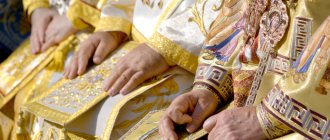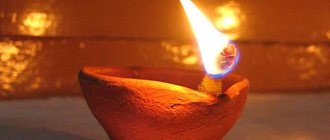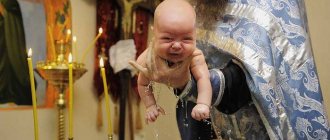Blessing of oil, or unction - what it is and why such an Orthodox service exists, approximately similar questions concern every believer. This Sacrament is interconnected with the most serious incidents in a person’s life - dangerous diseases, being on a deathbed, unbearable physical and psychological suffering.
Otherwise called Prayer Oil, it helps every Christian in suffering to see the beauty of spiritual birth, strengthen the fortitude of the spirit and helps a person to fully experience the blissful atmosphere of the Kingdom of God. But the main purpose of the Sacrament is the healing of physical and mental illnesses.
What is unction in Orthodoxy, why is it necessary to undergo unction?
Unction in church
Unction, or also called unction, is a sacrament. There are 7 sacraments in the Orthodox Church, a believer tries to observe them. These sacraments were established and observed by Christ himself with his disciples, and he commanded us to do so. These are the sacraments:
- Sacrament of Baptism . We encounter it in infancy or as adults, when a person is baptized in the church. It looks like immersing or pouring water on the baby 3 times and saying a prayer.
- Sacrament of Confirmation . The priest in the church uses a brush to anoint with church oil in the form of a cross - the forehead, chest, arms, legs of a newly baptized person, usually an infant.
- Sacrament of Marriage . We can observe it during the wedding of the newlyweds in the church, and the placing of crowns on the heads of the bride and groom.
- Sacrament of Communion . Holy Communion in the form of the Body and Blood of Christ is given to us by the priest with words of prayer in church after we confess our sins. As a sign of remission of sins, we receive a spoonful of Holy Communion, then wash it down with water.
- Sacrament of Unction . If it is God’s will, then after unction a seriously ill person can be healed. During this sacrament, seven prayers are read, usually by several clergy. After each prayer, the priest mentions the name of the sick person and anoints his forehead, chest and hands with blessed oil, and after the last prayer the priest places the Gospel on the sick person’s head and asks God for forgiveness of his sins.
- Sacrament of Penance . We come to church to the priest and want to confess our sins to him. In response, the priest orders us to adhere to a short fast (not to eat meat, eggs or dairy), not to sin, and to read prayers every day. After a certain time, we come to church again, tell the priest about the sins we have committed, deeply regretting it. If the priest undertakes to forgive you your sins, he reads 2 prayers, reconciling and asking for mercy on you before God.
- Sacrament of the Priesthood . This Sacrament is intended for those who have decided to devote themselves to God - clergy upon receiving the rank.
According to church ministers, during unction, a person is absolved of those sins that he does not realize are sins or has forgotten about them, and does not mention in confession. Unction can be carried out both for seriously ill people at home and for sick people who can come to church. Priests refuse to offer unction only to unconscious people and violent patients with mental illness.
Cost of the sacrament
The question about the cost of holding the sacrament is not entirely correct. Each person has his own capabilities, which is what should be taken into account when paying for unction. You can ask the priest himself about this, who will give you an idea of the price or perform the ceremony for free in the name of the Lord, depending on how the person’s life is structured.
Priests often have to visit both rich families and barracks where people with little income live. If there are many children in the family or a disabled person who needs constant care, then the priest will always rise to the occasion and will not take the money. Instead of money, it is allowed to present a little rice and a bottle of olive oil as payment.
When does the unction take place in the church?
Unction in the church is prescribed by the priest, mainly in Lent.
There are 2 types of unction:
- At home for a sick person
- In church - for everyone who wants to receive unction and can come to church
In a church, a priest can schedule unction during Lent (before Easter) or during Lent (before Christmas). You can take unction once a year if a person feels a great need to cleanse the soul or is seriously ill. Before unction, it is advisable to confess your sins.
The unction must be carried out by 7 priests, but if there are not so many, and even one, if he conducts the unction, it is considered effective.
How is Unction performed?
The ritual is divided into three actions: prayerful singing, consecration and anointing. Duration varies from 1 hour to 4 hours. This depends on the number of parishioners who came to the sacrament.
If you feel bad during the ceremony, you don’t need to think that you are a lost person. Perhaps your body simply reacted this way out of hunger, perhaps this happened due to your physical condition, maybe it was just stuffy in the temple. You can simply go outside and get some fresh air; in more severe cases, do not hesitate to ask to call an ambulance. In any case, no one will turn away from you or forbid you from coming to the temple. Do not worry.
More details on All Iskitim: https://vesiskitim.ru/2021/04/10/202040-tainstvo-soborovaniya-2021-kogda-proxodit-i-kak-gotovitsya-k-otpushheniyu-grexov-pravoslavnym
How does unction take place in church, how to behave: rules
During unction, there should be a large vessel with grain on the table, a small vessel with oil on it, and 7 candles lit.
Believers who are 16 years old can receive unction , but you can come to the unction from the age of 8 , and for small children under 7 years old, God is all sins releases without unction.
People have different opinions about unction: some believe that such a sacrament will definitely help to recover, and when they are a little sick, they go to church to receive unction. Other people, even when they are seriously ill, are afraid of the sacrament of unction and refuse it. But there is no need to be afraid, because priests perform unction not for death, but for life.
On the day when general unction is appointed in the church, a table with a cross and the Gospel is set up, as well as a vessel with wheat, on which is another smaller vessel with oil and wine. 7 sticks with cotton wool are placed in the wheat - for anointing. There are 7 candles lit on the same table. Believers stand around, wishing to receive unction with lighted candles in their hands, listen carefully to the words of the prayer, and wait for anointing 7 times. Between anointings, priests read prayers. Anointings are performed in the form of a cross on the following parts of the body (they must be freed from clothing):
- Forehead
- Nostrils on both sides
- Both cheeks
- Lips
- Both hands
- Small area below the neck
After the seventh anointing on the heads of the assembled people, the priests lower the Gospel with the text down, saying a prayer ending with the words “Lord have mercy.” After this, the congregants kiss the Gospel, and deeply believe that all sins have been forgiven by God, and they can continue to live with new strength.
If you are late for the unction for reasons beyond your control, and if at least one anointing was missed, the sacrament is considered effective, but you still need to try to arrive on time.
What is the Sacrament of Unction
Unction is one of the ancient sacraments of the Orthodox Church. The purpose of this procedure is to forgive sins and heal ailments: both physical and mental. The ritual involves anointing a person’s forehead, nose, lips, cheeks, chest and hands with sacred oil. The anointing is done in the form of a cross. The procedure is performed for a person who has been ill with a serious illness for a year or more. Also, this ritual is carried out in the church every year on the eve of Lent, and all parishioners who wish can voluntarily undergo it.
The name of the procedure itself comes from the word “cathedral”. The ritual, as has long been customary, is carried out over a person by a “cathedral”, that is, several priests at once. During unction, priests read prayers, the texts of which speak of the remission of sins and the healing of the soul.
Oil is consecrated vegetable oil. In ancient times, oil was used not only for cooking, but also as a medicine, cosmetic, and fuel for lighting. In ancient times, the abundance of oil was considered a blessing. Therefore, it is still used in church rituals to this day.
Unction in church: what should you take with you?
You should have a candle with you, 2 handkerchiefs, your head must be covered with a scarf or something else.
A few days before the unction, priests advise you to undergo the Sacrament of Confession. If, when you are getting ready to go to unction, you don’t know what to take with you, then here are the tips of people who have undergone unction. The following is needed :
- Take money to buy a candle and leave a donation to the temple
- Take 2 new handkerchiefs: one to hold a candle, the other to blot your face, hands and neck from the oil (you can’t throw away the handkerchief, you need to burn it at home or wash it)
- There is no need to wear a sweater with a standing collar; the neck should be free (the priest applies oil in the place of the cleavage)
- Come to church service on time and defend it
- Unction
- And receive Holy Communion
Preparation for Unction
On the eve of Unction in the temple, you should definitely confess and receive communion. Following the religious Christian canons, there is no layman who has never stumbled by committing ugly acts. However, by realizing your mistakes and admitting guilt, you can receive absolution.
Communion refers to the seven Holy Church Sacraments. When passing through the fulfillment of the sacrament, lay believers with bread and red wine believe that they are receiving the Body and Blood of the Lord Himself. And Christians believe that through him they are physically united with Christ.
Those suffering are psychologically prepared for Communion by fasting, through:
- turning to God through prayer;
- fasting;
- repentance;
- confession.
In the absence of imminent danger, there is no reason to perform both Sacraments, but confession should be made.
Required Items
How to prepare and what to take with you to church for the Sacrament - all this must be learned in advance in order to feel confident and calm during the service. It is advisable for newcomers to familiarize themselves with the rules of church etiquette; this will help them feel like a full member of the Orthodox community. On the day of the Sacrament, you should approach the temple in advance.
Anyone who has expressed a desire to receive unction must:
- add your name to the list of participants;
- buy a large candle;
- Have napkins with you to wipe off excess oil.
You can donate a bottle of oil. The cleaning material is then supposed to be destroyed in a fire, if this is provided, in a temple or at home. Many people ask the question: is it possible to eat before unction? It is imperative to satisfy your hunger slightly at home, because the service lasts a long time.
Terms of fulfillment
The Blessing of Anointing can be performed in a solemn or ordinary setting. Healthy people can receive unction once during Lent together with all participants.
The sacrament can be performed on:
- believers and baptized;
- being conscious;
- over 7 years old;
- suffering from physical and mental illness.
In Greek temples it is allowed to perform the rite of communion without repentance.
The right state of mind
In today's complex and chaotic world, there can be no absolute and irreversible healing of bodily diseases. Unlike physical ones, mental ones are more easily healed by undergoing the ritual of Blessing of Unction. Blessed Oil gives the sufferer strength that can overcome despondency and despair.
Unction may not be beneficial due to superstitious prejudices and skepticism. A Christian who wants to cleanse his soul must initially strengthen his faith in the Holy Spirit.
Unction in church: how long does it last?
Unction lasts a long time, from 2 to 6 hours.
Unction lasts a long time, from 2 hours, provided that 1-2 people will perform unction, but if there are many people who want to receive unction, then more time is needed. During the passage of this Sacrament, the priests read the following prayers:
- Preparatory
- Canon
- 7 excerpts from the Gospel and the Apostle, New Testament
- Litany (appeal to God in prayer)
- Blessing of oil and prayer
- Anointing the forehead, hands and chest with oil, and prayer
If the consecrated oil (vegetable oil) remains, it can be taken home by the congregation, and then used for anointing and added to food. Oil is also used when burying a deceased person (before closing the coffin lid, oil is poured into the coffin and then closed).
Oil for anointing
Oil for anointing must necessarily be of plant origin.
The mixture is lighter than water, never combines with it, and has the following characteristic qualities:
- fluid deformation;
- humidity;
- ability to burn independently.
The color of the flame has a pleasant, quiet light and has a psychologically beneficial and calming effect. In his spiritual qualities he can be identified with gentleness, good nature and love. Wine is added to the oil, which symbolizes the atoning blood of the Savior, which the Lord shed on the Cross to save people.
How to choose
The consistency of the oil should be liquid, and the method of purification should be refined. It is preferable to use olive oil because it has been used in worship since ancient times. Until the 19th century, the unctuous mixture consisted of two mixed components: Provençal (highest) and wood (lower) grades of oil.
Blessed oil can be:
- lamp-shaped;
- Vaseline;
- vegetable.
The plant can be used in food by adding a few drops to foods.
What to do with it after the ceremony
In ancient times, shrines used during services were always burned in the temple in a special oven. Nowadays, parishioners are increasingly asking to take home the oil to use as needed.
Blessed oil can be stored in the house, preferably near the icons. Those who believe in the healing powers of oil rub the mixture into sore spots, add it to food or burn it in a lamp.
Unction for seriously ill patients at home: how to prepare for it?
Unction can be ordered at home.
Unction is necessary for a person if he is lying in bed and has difficulty getting up. With this Sacrament, a person will get rid of unconscious sins. If a priest comes to your home, a seriously ill person can, along with unction, repent of his sins and receive communion. Other family members can gather together with the sick person if they see the need for it.
A sick person does not particularly need to prepare for unction; it is important to repent of the sins that you have committed earlier and read prayers as best you can (you can in bed).
When the priest arrives to administer unction to the sick, someone from the family should prepare:
- Clean and empty table
- Chair
- Olive oil
- Full kettle of boiling water
In what cases should a person be unctioned?
The clergy agree that this is necessary in the following cases:
- serious physical illness - even if it is a child under the age of seven (in general, children younger than this do not proceed to the general Unction);
- suffering from a serious mental illness: despondency, grief, despair;
- a fatal illness that does not allow one to get out of bed and come to church.
In any case, the believer must be conscious. Unction is not performed on violent mental patients. And one more thing: oil is used to anoint the living, not the dead.
Healthy people should not take part in the Sacrament of Anointing.
How much does unction cost?
Unction costs little money, so donate to the church.
If the unction takes place in a church, there are prices for each Sacrament, you can find out about this in the church or church shop, usually churches have them now.
If the unction takes place at home, and you don’t know how much money to give for the unction, repentance and communion, then you can ask the priest. Each family has its own capabilities, and the priest sees this.
If unction is necessary, and a sick person wants to undergo unction, but he does not have money, then he must immediately say so, and the priest will perform the Sacrament of Unction for free.
How to prepare for the Sacrament of Unction
The clergy advise preparing and preceding the Blessing of Unction with confession and communion. Translated into everyday language, it’s as if someone wanted to come to visit a dear large family rested and festively dressed, and not drop in in a hurry, in jeans and worn out shoes. But in any case, the family will be delighted with the arrival - the main thing is that the dear guest arrived.
So no special preparation is required, faith and repentance are important.
Often women do not dare to take up the priesthood due to regular weakness. It's better to ask the priest. After all, this is also bodily weakness and a consequence of sin - why deny the opportunity to get closer to the kingdom, like all other sick people?
On the appointed day, you need to sign up to participate in the narthex of the church, saying your name and taking a candle. Some temples provide a paper napkin to collect excess oil from the skin. Before starting the action, you need to expose your arms, neck and forehead.
What does it mean if you feel sick during unction?
After unction you can feel bad for various reasons.
The question of why you can feel bad after unction was asked by believers to a minister of one Orthodox church. He replied that there could be several reasons:
- Physical state of human health not related to unction
- Feelings about Unction
- For a person who has not repented of his sins, unction may not bring relief, but rather suffering.
Also, in the practice of clergy and believers, there were cases when a person did not adhere to one faith, but rushed into one faith, then into another, and returning back to his previous faith, he felt bad in the temple.
What it is?
Unction (unction) is one of the 7 sacraments of Christianity. It consists of anointing a person with consecrated oil (oil). Usually the sacrament is performed on a person who is sick spiritually (loss of faith, grief, depression) or physically. Unction is often performed on dying Christians, along with the last confession and other rites designed to prepare the soul for the afterlife.
The sacred meaning of unction is healing from illness and sorrow. It is believed that during the ritual, confessors forgive sins that the believer has forgotten or committed due to his own foolishness. Such sins in Orthodoxy are called “involuntary.”
In some cases, the sacrament of unction has to be resorted to several times throughout the entire period of illness - until the person recovers.
If you believe the stories of the people on whom the unction was performed, after the ceremony most of them felt obvious relief. Many were completely cured of their illnesses. What is this: the power of faith or divine providence? Unfortunately, this phenomenon cannot be explained from a scientific point of view.
Whose life changed after unction: reviews
There are many cases of healing of the sick after unction.
There are cases when after unction it became easier or all the sores went away.
Here's one of them. The story is told by priest Sergius Kruglov, Minusinsk . In March, I had to work at a construction site in a neighboring village. I walked home, the snow was melting, there were puddles all around, my feet got wet. And after some time, doctors discovered that I had double pneumonia. Then I spent a long time in the local hospital, but they discharged me with not very good results: lung damage in the form of black spots, and constant monitoring by a phthisiatrician. In the fall, I received unction, and after a while I visited the doctor as planned, with fluorography. The doctor turned my picture over in her hands for a long time and said in surprise that there was no illness, everything had gone away.
Nina Alexandrovna, living near the Optina Pustyn monastery . We moved with our sick son and old mother from Moscow to a village house not far from Optina Pustyn. There is a lot of work in the village, but I did it all alone, and I broke my back. At the hospital they said that I needed an operation, but how could I leave my family alone at home? I told the elder from the monastery about my troubles, and he advised me to take unction. I barely reached the church, and there the newly minted hieromonks conducted the service for six hours. By the end of the unction she began to doze off, but she persevered. I left the temple, went home, the fatigue and pain disappeared as if by hand. At home I started watering the garden with buckets, sat down to rest, and then I only remembered that my back used to hurt.
So, from this article we learned that unction can help us endure physical and mental pain more easily.
How to use rice and oil after unction?
The oil consecrated during the Unction, and the rice (or other grain) in which candles were placed during the Blessing of Unction, are often taken home by believers, according to a widespread tradition. Then they are anointed with this oil or burned in a lamp, and some people eat the grain (and if it is not rice, but wheat, then they sprouted it).
In ancient times, believers did not take away oil and rice after Unction, but all this was to be burned at the temple. Now parishioners themselves often ask the clergy to distribute to them what is left after the service, believing that by anointing the sore spots of themselves or someone close to them with the oil consecrated at the Unction, they can also receive God’s help. Of course, such actions do not replace what happens during the Sacrament, when priests and Christians pray together for healing from illnesses, but there is nothing reprehensible in this when it is not perceived as a magical ritual.
But if you are not sure that you will and can use them, there is no need to take oil and rice after Unction. Oil, rice, candles are just attributes that give a person living on earth the opportunity to sense what is happening to him with his basic senses. But it doesn’t matter whether you brought something material home with you after the Sacrament in your hands, if you didn’t bring anything in your soul.











